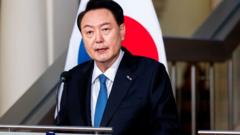South Korea's political landscape is becoming increasingly volatile as the leader of the ruling People Power Party (PPP), Han Doong-hoon, has issued a stark warning regarding President Yoon Suk Yeol's continuation in office. In a striking turn of events at an emergency party meeting, Han urged Yoon to "suspend his duties soon," citing concerns that the citizens could face "great danger" under his leadership due to what he described as credible evidence of Yoon’s involvement in ordering the arrests of significant political figures on dubious "anti-state charges."
Han's statements signify a notable shift in the ruling party's previously unified stance against the impending impeachment motion from the opposition, which is set to be voted on Saturday. For the impeachment to succeed, the opposition requires support from at least eight members of the ruling party, creating a critical juncture in South Korea's political discourse.
In the wake of these developments, concerns have mounted surrounding possible "extreme actions," including previous declarations of martial law, should Yoon remain in power. "This could put the Republic of Korea and its citizens at great risk," Han warned, hinting at potential plans to further detain arrested politicians in a facility located in Gwacheon, south of Seoul.
The situation has led to calls for unity against potential injustices, exemplified by ruling party MP Cho Kyung-tae, who has broken ranks by supporting Yoon's impeachment. Cho articulated a profound choice for politicians: either to align with the people's desire for justice or to become complicit in the repercussions of authoritarian rule. "I hope that all the politicians of the People's Power will stand on the side of the people," he stated, reflecting a growing dissatisfaction within the party regarding Yoon's governance.
As political tensions flare, the implications for South Korea's democratic principles and institutions remain to be seen, highlighting a deeply divided response to leadership and governance in the nation.


















